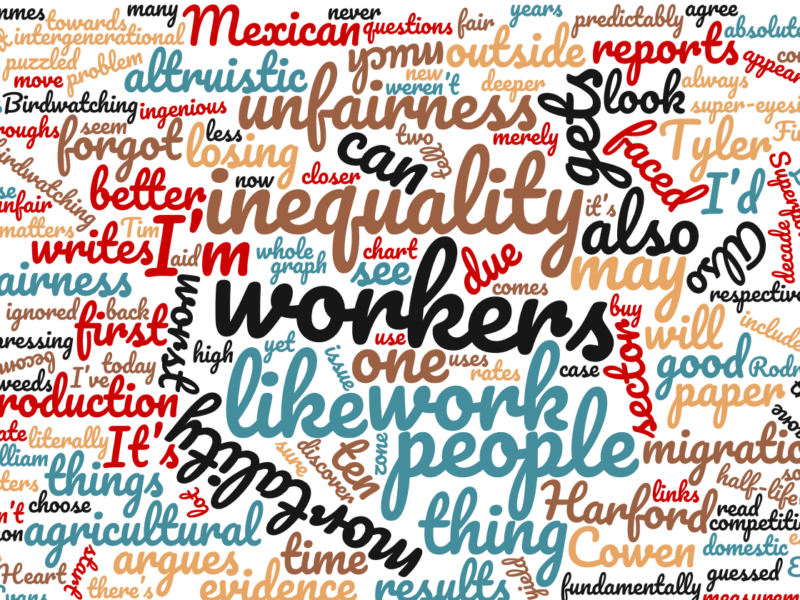Hi all,
Sorry about the radio silence last week. In typically dedicated civil servant fashion, I completely forgot it was Easter until it was right upon us and so forgot to warn you all I’d be offline. I’d like to think you all missed it, but if you’re anything like me (and I accept this is a remote possibility unless you, too, are a cricket-obsessed birdwatcher with a weakness for gifs of face-melting dunks and children overreacting to things [note: this is the best thing on the internet]), you were probably too busy enjoying the now even-more-efficient 24-hour-Summer England has patented. It’s gloomy outside, a general election has been called (which reliably brings out the worst in… oh, just about everything) and so I’m going straight to the economics.
1. Election season doesn’t seem to be a fashionable time for evidence or logic, but let’s try some, shall we? There is vanishingly little evidence that reducing the rate of migration will make things better for local-born workers. It’s a very difficult area to research, but Michael Clemens, Ethan Lewis and Hannah Postel have had a go by looking at data from the exclusion of Mexican workers in the US agricultural sector, the Braceros, in the 1960s. Their results are fascinating. Essentially, what happened was farms faced with the deficit of Mexican workers did not turn to hiring new workers from other countries or local workers – they mechanised their production instead. This shouldn’t be a surprise: faced with a change in the relative price of inputs, any private sector entity will seek to reorient production processes away from the relatively more expensive one. I’ve linked to this work before, but it bears repeating. Evidence won’t trump emotion, but it can’t hurt to have.
2. From migration to inequality: first, FiveThirtyEight reports on health and mortality inequalities in the US, and demonstrates that the places with the worst outcomes are incredibly easily predicted from a map drawn in the 1860s – one which shades each county by the number of slaves at the time. While Deaton and Case got a lot of attention for their finding that mortality among older white males may be rising, 538 point out the reason why black people weren’t included in that graph: their mortality rates are so high they would be literally off the chart. Also, Tyler Cowen reports on a paper that argues that fairness matters more than inequality. This may be the case, but there’s a deeper problem he has always ignored: unfairness can be intergenerational, and what may look ‘merely’ like inequality today becomes much closer to unfairness when you look back a decade or two. What is the half-life or unfairness?
3. Rodrik gets into the whole fairness vs. inequality issue, and argues that people see losing out due to trade as ‘unfair’, but losing out due to domestic competition as ‘fair’. I’m not sure I buy this.
4. What Superpower would you choose? And how would you use it? An ingenious paper uses these questions to discover how fundamentally altruistic people are, and comes up with predictably depressing results. [And also, super-eyesight and birdwatching, respectively. Birdwatching is a altruistic, because I can then tell you about what birds there are outside].
5. Tyler Cowen thinks that people are becoming more complacent: they move less between jobs and locations; Tim Harford suggests that there are other explanations for this phenomenon. They both see it as a pity, and I very much agree with Harford: being forced out of your comfort zone is a good thing, one that we all undervalue.
6. Everything David Evans writes is worth reading, which is an enormous compliment because he writes more than virtually any other development blogger out there. This piece is about scaling up successful programmes, and like most of his work is directly relevant to making aid work better. Also from Development Impact, Markus gets into the weeds on agricultural yield measurement – this is absolutely brilliant, and gets towards solving something that has puzzled me for years.
7. Finally, I would never have guessed William Burroughs was a cat-lover, but so it appears. And also from LitHub, ten writers whose first work was also their masterpiece. It could have gone on for many more than ten . If you haven’t yet read The Heart is a Lonely Hunter, it’s a good thing I’m ending the links here, because you can start immediately.
Have a great weekend, everyone!
R

